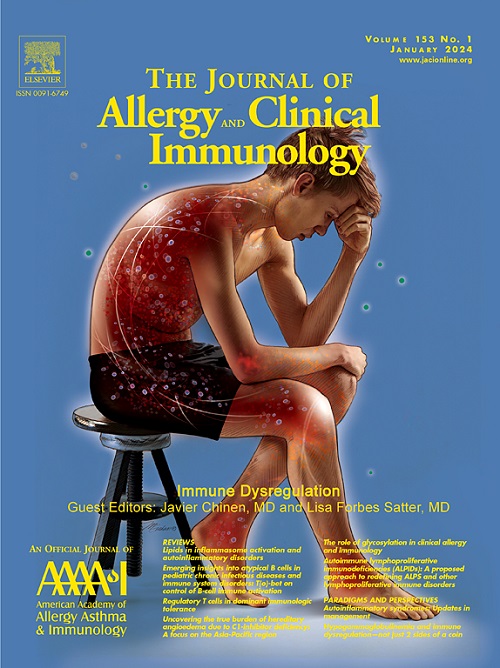孕期和哺乳期补充益生元对婴儿过敏性疾病的影响:随机对照试验。
IF 11.4
1区 医学
Q1 ALLERGY
引用次数: 0
摘要
背景:妊娠期和哺乳期摄入益生元可能对胎儿和婴儿免疫系统的发育具有免疫调节作用,并为降低过敏性疾病的风险提供了潜在的饮食策略:在孕期和哺乳期摄入益生元可能对胎儿和婴儿免疫系统的发育有免疫调节作用,并为降低过敏性疾病风险提供了一种潜在的饮食策略:本试验旨在确定母体补充益生元是否能降低具有遗传风险的婴儿患过敏性疾病的风险:我们进行了一项双盲随机对照试验,孕妇被分配食用益生元(每天14.2克半乳糖寡糖和果糖寡糖,比例为9:1)或安慰剂(每天8.7克麦芽糊精)粉末:652名妇女在2016年6月至2021年11月期间接受了随机试验(n=329益生元,n=323安慰剂)。在1岁前患有医学诊断湿疹的婴儿比例方面,各组间无明显差异(益生素为31.5%(103/327名婴儿),安慰剂为32.6%(105/322名婴儿);调整后相对风险为0.98(95% CI 0.77,1.23;P=0.84)。各组间的次要结果和安全措施也无显著差异:我们发现,对于有过敏性疾病遗传风险的婴儿,几乎没有证据表明在孕期和哺乳期补充母体益生元可降低1岁前婴儿经医学诊断患湿疹的风险。本文章由计算机程序翻译,如有差异,请以英文原文为准。
Effects of pregnancy and lactation prebiotics supplementation on infant allergic disease: A randomized controlled trial
Background
Ingestion of prebiotics during pregnancy and lactation may have immunomodulatory benefits for the developing fetal and infant immune system and provide a potential dietary strategy to reduce the risk of allergic diseases.
Objective
We sought to determine whether maternal supplementation with dietary prebiotics reduces the risk of allergic outcomes in infants with hereditary risk.
Methods
We undertook a double-blind randomized controlled trial in which pregnant women were allocated to consume prebiotics (14.2 g daily of galacto-oligosaccharides and fructo-oligosaccharides in the ratio 9:1) or placebo (8.7 g daily of maltodextrin) powder from less than 21 weeks’ gestation until 6 months postnatal during lactation. Eligible women had infants with a first-degree relative with a history of medically diagnosed allergic disease. The primary outcome was medically diagnosed infant eczema by age 1 year, and secondary outcomes included allergen sensitization, food allergy, and recurrent wheeze by age 1 year.
Results
A total of 652 women were randomized between June 2016 and November 2021 (329 in the prebiotics group and 323 in the placebo group). There was no significant difference between groups in the percentage of infants with medically diagnosed eczema by age 1 year (prebiotics 31.5% [103 of 327 infants] vs placebo 32.6% [105 of 322 infants]; adjusted relative risk, 0.98; 95% CI, 0.77-1.23; P = .84). Secondary outcomes and safety measures also did not significantly differ between groups.
Conclusions
We found little evidence that maternal prebiotics supplementation during pregnancy and lactation reduces the risk of medically diagnosed infant eczema by age 1 year in infants who are at hereditary risk of allergic disease.
求助全文
通过发布文献求助,成功后即可免费获取论文全文。
去求助
来源期刊
CiteScore
25.90
自引率
7.70%
发文量
1302
审稿时长
38 days
期刊介绍:
The Journal of Allergy and Clinical Immunology is a prestigious publication that features groundbreaking research in the fields of Allergy, Asthma, and Immunology. This influential journal publishes high-impact research papers that explore various topics, including asthma, food allergy, allergic rhinitis, atopic dermatitis, primary immune deficiencies, occupational and environmental allergy, and other allergic and immunologic diseases. The articles not only report on clinical trials and mechanistic studies but also provide insights into novel therapies, underlying mechanisms, and important discoveries that contribute to our understanding of these diseases. By sharing this valuable information, the journal aims to enhance the diagnosis and management of patients in the future.

 求助内容:
求助内容: 应助结果提醒方式:
应助结果提醒方式:


